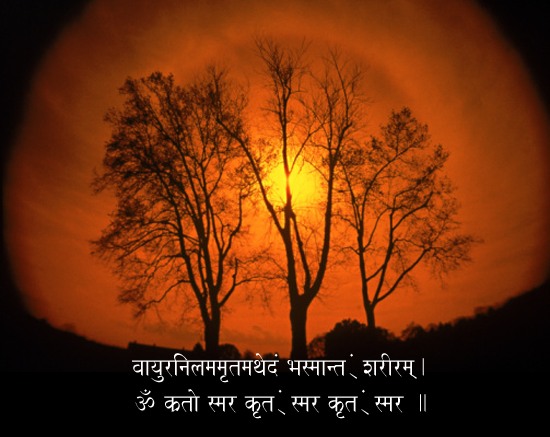Feb 22, 2026
Feb 22, 2026

Vayur-anilam-amrtam athedam
bhasmantagam sariram,
om krato smara krtagm smara
krato smara krtagm smara. (17)
The Person dwelling within you,
That I am.
Let my Prana vayu (breadth) merge
in the cosmic energy of your rays
and this physical equipment of the body
be reduced by fire into ashes.
At this junction, Om!
Remember and remember only
the good deeds of mind that I did.
Commentary
Maharishi Raman is clear in his opinion that supreme state always remains the same by whatever path and whatever religion a seeker approaches Him; the Being, by its very nature is beyond differentiation. Once attained, the state of self –realisation remains the same. There are three aspects of God and one is free to approach any. God is Sat (Being), Chit (Consciousness) and Ananda (Bliss). Raman Maharishi says that the Jnanis work on the aspect of Being, repose in the essence of Being and ultimately lose their individuality in the supreme. The Yogis approach through the conscious aspect and try to steady the mind to behold the glory of God as the Light radiating everywhere. This aspect has also been depicted in the previous shloka 16. The next (shloka 18) verse depicts the Beatitude aspect of a devotee intoxicated with nectar of love of God as he loses his identity in the Blissful experience of devotion.
The seeker in his meditation sheds all his ego-sense and gets attuned to Consciousness and Pure Awareness as his perception goes beyond the limit of time and space. He is one in the oceanic flow of all pervading Divine presence. He has conceived the ultimate Reality of Oneness and has brief ecstatic intimations of it. Owing to fluctuations of vasanas, realisation takes time to steady itself. So the seeker wishes that his physical equipment be destroyed in total and the Pranavayu, the breadth, merge in Consciousness itself. Every moment he may rest in the Consciousness like a river merged in ocean. He may ever be the radiant Light Itself.
The Vedanta says that when a devotee realises that, That I am, one knows oneself as spirit. There is neither land nor sea, no earth nor is sky for him as Omnipotent and Omnipresent. This is the state of his approach of Conscious aspect where he sees the glory of the Consciousness of Being of God as the Light pervading all and nothing pervading it. In this state of Eternal joy and ecstasy, the seeker wishes to live in the moment and not regret the past or anticipate the future. Vedanta says that when actions and desires are sincerely directed towards the Divine, it is then that awareness and consciousness is elevated and realisation attained. When we are attuned to God, our perception is limitless and all pervading is the oceanic flow of the Divine presence. When That I am is known, when we know ourselves as spirit, there is no limit of Time and Space as all is He. This is the state of glory of our chit. the Consciousness of Being. He wishes to remember all such acts and deeds that have helped him to reach this state.
It is generally believed that whatever thoughts enter the mind at the time of his physical elimination called death, they accordingly shape his next life to some extent. This is why in the prayer, the seeker who has shed all his ego of iness and lost himself to any notion of physical form, wishes that only those thoughts occupy him to his last breadth that have fixed him in God. He wants to stay fixed in that state for ever. Such a one is never again born.
Some prevalent notions about liberation are that it is gained only after death and it is the attainment of a subtler field of experience where we receive such joys and pleasures that are not available in human world. They understand that liberation means going to heaven , a land unknown and unseen. The reality is that the Eternal Infinite Brahman is the nature of Self alone and not of objects and is therefore ever liberated. Liberation is gained here and now in this very body.
Previous: Isha Upanishad - Shloka 16
Next: Isha Upanishad - Shloka 18
03-Jul-2011
More by : Dr. R. K. Lahri

|
The shloka, the explanation! It's simply marvellous. It's beautiful. |